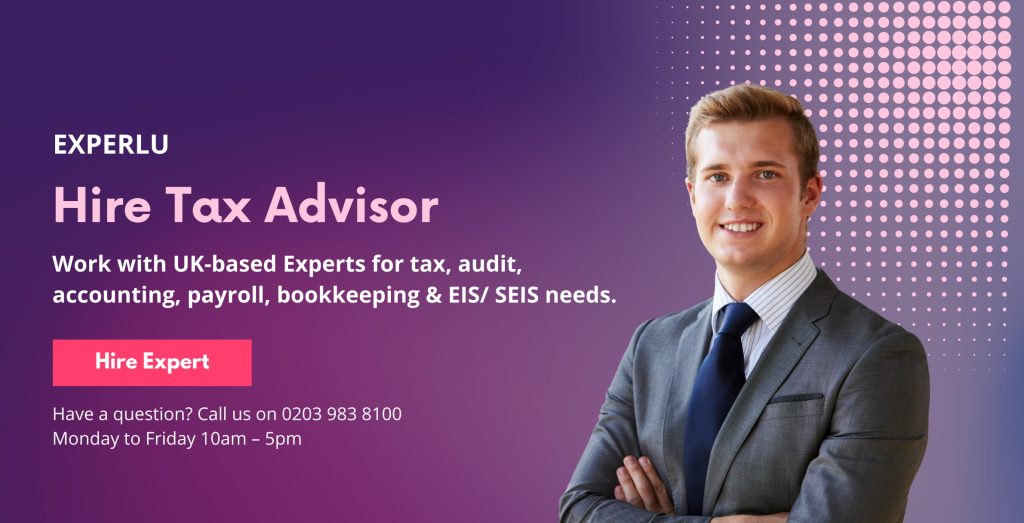Tax advisor: As a business owner, you will almost certainly end up taking on a number of daily tasks within the business.
No doubt, the best professional support for your business is one of the most powerful tools you can have in your arsenal.
As opposed to accountants, tax advisors are tax specialists and usually have a good understanding of basic accounting principles. Small businesses typically require tax advisors’ assistance on specific matters, like issuing share options, acquiring new companies, restructuring, or complex VAT matters.
Most medium-sized accounting practices have dedicated tax experts; however, small accounting practices or one-man-band usually don’t have tax experts on board. So if you need a tax advisor, the first task is to ask your accountant if they have one in their team?
But if you are still looking to hire one, then this blog post is for you.
This blog post is divided into the following sections
Table of Content
The role of an accountant
Before explaining a tax advisor’s role in detail, let’s understand an accountant’s typical function.
Broadly speaking, accountants manage your business and personal accounts, assist you with tax returns preparation and filing, and advise on essential tax compliance.

Whilst accountants may also give you some tax advice and assist your tax planning; this would tend to be more general in nature.
You will find not any hard and fast rule as to exactly what an accountant’s role may contain, but common tasks may include:
- Corresponding with the relevant authorities – HMRC, for example
- Calculating and submitting VAT return
- Filing returns – Corporation and self-assessment Tax, VAT, et
- Preparing management accounts and year-end accounts
- Preparing cash flow forecasts and budgets
- Ongoping cashflow monitoring
- Advising on business strategy
- Cash flow forecasts
- Preparing annual accounts in compliance with the applicable accounting framework
- Often accountants have bookkeepers and payroll operators
The role of an accountant is very diverse.
Though accountants do the same tax-related tasks, give tax advice and financial planning within their offering, they do not focus on this only element in the same way as a tax advisor do – that’s why they cannot provide such specialist, detailed advice when it comes to tax.
The role of a tax advisor
The tax advisors solely focus on the tax matters of a business.
Tax advisor spends significant amounts of their time keeping up-to-date with the latest tax regulations and tax cases to form a great strategy that will help to slash or eliminate the tax. Most tax advisors have tax qualifications, like CTA from the Chartered Institute of Taxation.
Tax advisors can help you save taxes in certain situations and various possibilities.
A tax advisor can help founders and management establish their companies and communicate on behalf of clients with public authorities or tax courts, if necessary.
As such, tax advisors are uniquely placed to serve their strategic advice on even the most complex areas of tax.
The tasks of tax advisors may include
- Complex VAT issues and interpretation of the Law
- Cross-border tax laws and related issues
- Overseas employees, international secondments and related issues
- Transfer pricing and cross border transactions
- International tax refunds, withholding tax and tax credits
- Communication with tax authorities in different tax jurisdictions
- Advice for founders in terms of establishing the company
Also, don’t forget to visit our blog post related to self assessment tax return.
Choosing an accountant or tax advisor step by step
Step 1 – Identify your needs
Get a clear idea about the services you want from your accountant or a tax advisor. Even before looking for assistance, document your problem well and know where you need help.
You can simply hire an accountant to do your annual accounts or to manage everything from bookkeeping, payroll to VAT returns and management accounts, but if you want special advice for tax purpose, then you can consider a tax advisor.
Step 2 – Decide if you need an accountant or a tax advisor
People will actually need both an accountant and a tax advisor. However, it is essential to figure out why you need them – do you need a professional for both to handle accounts and guide you with your tax return? Or someone to give sound advice and guidance that will legally save you money?
This decision depends entirely on the area in which you need advice. Once that is done, then decide whether you need an all-rounder or someone specialist in the field? Like there are tax advisors, specialising only in employment taxation and others only in VAT.
Think of it as a doctor, you will find a GP who has a basic knowledge about human physiology, anatomy and so on, but a GP is not a specialist. On the other hand, a cardiologist, Neurologist, Nephrologist, Gynaecologist, Dentist, etc., are specialists. We can’t say that the tax laws are as complex as a human body; however, they are not simple.
However, if you are seeking a specialist or more complex tax guidance, then it is essential to hire a tax specialist.
Let me put simply; a tax advisor has had more deep knowledge in a specific area of taxation in much finer detail, giving them the ability to view your circumstances with a keener eye and spot opportunities that could otherwise be missed from someone without this greater depth of knowledge.
If you are still unsure, ask your accountant or friendly customer services representatives at Experlu. They will guide you in the right direction.
You could be in situations where an accountant can be more suited to your business, even within the broader or some common areas of taxations.
Are you a small business owner, do you think you need an accountant – confused!! No worries check our blog post, “Do I need an accountant for my small business” to clear the confusion.
Step 3 – Start hunting for professionals
So, now you decided which professional you need in your team – an accountant or a tax advisor and now start finding top-notch individuals in their fields for hire.
For this, you can ask for referrals to your colleagues or friends as it can be a useful trick to reach out to the professional.
Word of mouth can be a powerful tool when you are looking for any service.
Google and LinkedIn search is also helpful, and don’t forget to read their profiles, reviews, etc.
You can also ask other businesses about the same size as yours; you might get some clues about tax advisors or accountants who are local, helpful, and friendly.
Hey! But don’t just stop there!
Asking around is a quite good first move, but there is so much more to a business than meets the eye; it’s all about taxes, assets, employees, goods and services.
However, you can also do this by simply filling a form on Experlu.
Step 4 – Shortlist a few professionals and have a chat
After reviewing all the professionals’ qualifications, experience, and reviews, select three tax advisors to chat with.
Have an introductory chat that should cover the following things,
- Qualification and certifications
If you are considering a tax advisor, then most reputable tax advisors are a member of a professional tax body, enabling them to practice tax, like the Chartered Institute of Taxation.
- The service fee
Ask them if they will take flat charges or an hourly basis or are there any hidden charges. Most will either charge on a project basis or hourly. Rates will vary based on skill and experience.
- Industry expertise
Ask them if they have worked with businesses similar to yours, or do they have any working experience in your business industry?
- Availability
Ask when the accountant or tax advisor is available to you. If you are considering a tax advisor, then ask if they will be just in a tax time relationship or will they be open all the year to answer questions for you.
- Years of experience
When it comes to experience, make sure that you are hiring a professional with maximum experience in their field and your industry to gain long-lasting benefits from them.
- Complexity
If you are hiring a professional, then make sure that they can cleverly handle your business’s complexities.
Let’s say if you are doing business in the IT sector, then make sure the candidate has also worked with companies like yours and aware of all the challenges your business can face.
Step 5 – Hire and sign an engagement letter
After having your chat with the selected candidate, you must be clear about whom you want to work with.
But before choosing one, go through the experience and qualifications of tax advisors or accountants again.
Weigh all the ins and outs and decide who would be the best one to hire.
Choose a tax advisor by keeping long term benefits in your mind rather than based on any initial introductory price.
Now get an engagement letter issued by your chosen professional, and take time to read through it before signing.
Make sure any special terms you have agreed on are covered in the engagement letter.
A quick checklist to consider when hiring a professional
- Do tax advisors you are looking to hire have a good reputation?
- Are they recommended by people?
- Do they have proper qualifications and certifications?
- Are they approachable, and do they understand businesses of your size and in your trade sector?
- Do they have expertise in your particular field?
- Do they provide all the services you require now and as your business develops?
- Do they fit your budget?

Final thought
Hopefully, choosing and hiring a tax advisor or accountant is easy and straightforward with Experlu. Just three easy steps and you will get the best quotes from the best accountants or tax advisor. Not only that, but you can ask for a customized set of services as per your requirements. Many people are getting their professional with Experlu – you can be the next and join the list.











Leave a Reply